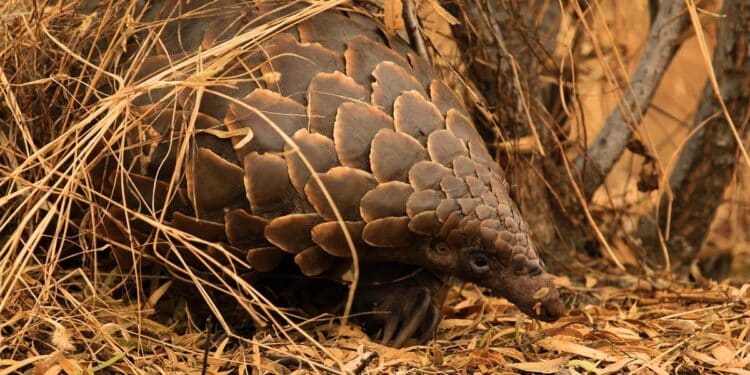The world’s most trafficked mammal may disappear before most people have even heard of it. The pangolin, a shy, nocturnal animal that looks a bit like an armadillo, is found in Africa and Asia. All eight pangolin species are at risk of extinction because of wildlife trafficking and all are protected by international law. Although it is hard to know exactly how many have been killed in the last decade, it is likely well over two million every year. Pangolin trafficking is increasingly undertaken by organized criminal networks who threaten not just the survival of the pangolins, but the safety and wellbeing of the communities that live near these animals.
The people and communities who live closest to pangolins and other trafficked wildlife pay the highest price as a result of trafficking. Since the majority of all emerging infectious diseases originate from animals, the trafficking of pangolins and other animals can put the global community at risk too. The case of pangolins is just one example of the urgent need to protect animals from illegal killing and to protect those brave enough to come forward with information to stop this wildlife crime before it happens.
OneNature was established during COVID-19, when it became clear that our economic and social systems and resulting exploitation of nature and wildlife had caused a devastating collapse of many natural and man-made systems. In fact, pangolin trafficking may have been a contributing factor to COVID-19, a virus thought to have originated in bats and leapt to people through an intermediary animal – likely a pangolin sold in a wildlife market.
At OneNature, we help people recognize and value the happiness, wellbeing, and interconnection of all people, animals, and the planet. We support communities on the ground by linking wildlife conservation with holistic community wellbeing to improve both conservation outcomes and community wellbeing. Communities living close to wildlife have valuable experience and wisdom in wildlife conservation and a stark awareness of the threats wildlife face. They may have important information to share about poaching and wildlife crimes but sharing it exposes informants to great personal risk. This information could be critical to stopping poaching before animals are killed.
OneNature knows that we need to protect those providing information on wildlife crime – in communities and along the wildlife crime chain. U.S. whistleblower protection and reward laws have been effective in combating many types of crime worldwide. From wildlife trafficking to illegal logging, whistleblowers around the world often can be at the forefront of species preservation. Legislation and policies that establish incentives and protections for individual whistleblowers are critical. These protections can ensure the safety and well-being of the whistleblowers themselves and the animals we all want to protect. IUCN members have approved a new four-year program that addresses wildlife crime and whistleblowers. There are new resolutions on environmental crime with whistleblower provisions including resolutions on organized crime and on wildlife crime that will contribute to species conservation. In the U.S., we encourage Congress to pass the Garamendi/Young Wildlife Conservation and Anti-Trafficking Act with its important whistleblower provisions.
Individual and societal wellbeing depends upon flourishing biodiversity and respect for our fellow creatures. When we damage one another, other animals, or the planet, we damage ourselves. When we care for one another and nurture our planet and all of its lifeforms, we are investing in not only our own happiness but also the wellbeing of our shared relationships and ecosystems. Protecting wildlife and their ecosystems is essential to enhancing wellbeing, and protecting and rewarding whistleblowers is key to exposing and preventing the crimes that jeopardize this wellbeing for all beings.


